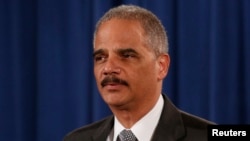In the wake of the twin terrorist attacks in Paris, the White House announced it will host a Summit on Countering Violent Extremism, focusing on domestic and international efforts to curb extremist violence before it occurs. U.S. Attorney General Eric Holder, who met with European security officials in Paris Sunday, said there is an increasing need for countries to share information to counter such threats.
The White House says the February 18 summit will "highlight domestic and international efforts to prevent violent extremists and their supporters from radicalizing, recruiting, or inspiring individuals or groups to commit acts of violence." White House Press Secretary Josh Earnest said these efforts have become more imperative in the light of recent attacks in Ottawa, Sydney and now Paris.
Learning from experience
The summit presentations, panel discussions and small group interactions will showcase programs in Boston, Los Angeles and Minneapolis-St. Paul to integrate the efforts of educators, mental health professionals, religious leaders, law enforcement, the private sector and technology community in heading off violent extremism. Summit presentations will also draw on the experience of other countries in trying to prevent attacks and foreign fighter recruitment.
Holder said Sunday on the ABC program This Week he made an appeal to European interior ministers to take part in the summit:
"…so that we can come up with a way in which we can deal with the root causes of what it is that attracts these young men to these really ideological, negative groups," he said.
Information sharing
The attorney general says information-sharing among nations is crucial in the fight against extremism.
"One of the things that we certainly gleaned from these interactions [in Paris] is there is a greater need for us to share information, to knock down these information-sharing barriers, so that we can always stay on top of these threats. One nation cannot by itself hope to forestall the possibility of terrorism even within its own borders," he said.
Jonathan Schanzer, a former terrorism finance analyst at the U.S. Treasury Department, and now vice president of research at the Washington-based Foundation for the Defense of Democracy, says many of these efforts were started in the wake of the September 11, 2001 terrorist attacks. He says the Paris events appear to have focused the Obama Administration anew on the threat posed by terrorism:
"The problem is we may have lost a lot of valuable time and, I think, probably another important point to note here as well is just the way the topic is framed is somewhat problematic," he said. "In other words, calling it violent extremism without talking about the ideology that spawns this violence I think does us no favors and ultimately, I think, will put us in a position where we will not be in a position to win."
Involving religious leaders, teachers
Schanzer says the U.S. already has important bilateral and multilateral intelligence-sharing relationships. He also says religious leaders, particularly Muslim, have been involved for years in efforts to diminish the terrorist threat.
"Teachers, I think that could be a very interesting one. I think there probably has not been a lot of work with the public school systems or with the parochial [religious] schools," he said. "The question is whether teachers are going to be able to be honest about what the challenge is without having to potentially insult students or their parents. Working with the tech community, this is incredibly important. The tech community can provide a huge amount of clues. We know, for example, Twitter and Facebook and other social media outlets have been providing assistance to the intelligence community for many years now. But, they have been fighting with one hand tied behind their back because they are not allowed to profile. There is extreme sensitivity about what we’re looking for in the first place."
Schanzer says Europe has already been hit with high-profile terrorist attacks, noting the 2004 Madrid train attack and the 2007 London subway bombings. He is not sure the French attacks last week will fundamentally change Europe’s approach to terrorism.
Attorney General Holder says there is no credible information that al-Qaida was behind last week’s attacks in Paris. He says al-Qaida’s leadership has been decimated by more than a decade of reprisals.
"The threat now, I think, really comes from al-Qaida affiliates, and chief among them would be al-Qaida on the Arabian Peninsula (AQAP)," he said.
He says they have the ability to inspire people, they have explosives experts and a capacity unmatched by any other terrorist organization.
As the French consider new security measures, U.S. Secretary of State John Kerry will arrive in France later this week for talks on countering extremist violence.




